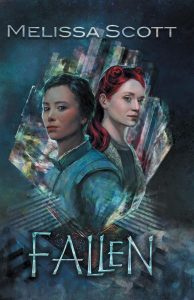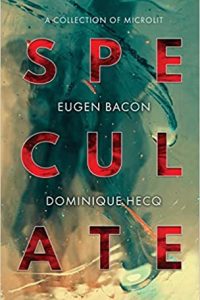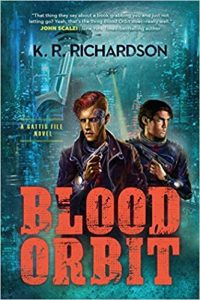Liz Bourke Reviews Fallen by Melissa Scott
 Fallen, Melissa Scott (Candlemark & Gleam 978-1-952456-20-6, $22.45, 302pp, tp) December 2023. Cover by Eleni Tsami.
Fallen, Melissa Scott (Candlemark & Gleam 978-1-952456-20-6, $22.45, 302pp, tp) December 2023. Cover by Eleni Tsami.
Melissa Scott’s Fallen might lack the sheer bloody energy of These Burning Stars, but it has instead the precise and understated competence of a writer who’s been honing her craft for four decades. Few of Scott’s novels are alike: while Fallen returns to the space opera universe that made its debut in 2018’s Finders, it takes place in an earlier era of that continuity, and occupies itself with different characters and concerns. (I do love a good sprawling future history, one with scope and depth, and Scott definitely has one of those here.)
Fallen is told in the first person, from the point of view of Nic en Doroney, the captain of a small cargo ship specialising in fast passage. Her latest trip has led her straight into trouble: an AI incursion, a space battle, and a port whose politics have recently become fairly hostile to trade – when Nic needs a cargo and a new destination in order to stay in business.
Interstellar travel is dangerous: The dimension through which ships pass in faster-than-light journeys, the ‘‘possible,’’ is some kind of substrate in which AIs make their home. The AIs were sealed out of the ‘‘real’’ as the result of an ancient conflict. They hold humanity in great enmity as a result of this conflict, and many of them, including the most powerful, want to return to the real and revenge themselves on the descendants of their old enemies. Humanity, meanwhile, is presently split between those who wish to study and use the works of the Ancestors (who created and then defeated the AI) and those who find the prospect of an AI incursion far too dangerous to risk the use of Ancestral technology – which can only, at any rate, be used by people who have inherited a nanite ‘‘burden’’ in their bloodline, or have had that burden shared with them through biotechnological means.
Nic has a secret behind her ability to make fast passage: She owns a piece of Ancestral technology that lets her, when in the possible, communicate with an AI and bargain with them (they, like all AIs seem to, want scrap remnants of Ancestral tech) to guide her clear of the attention of other AIs. Nic doesn’t think this AI is very powerful, but dealing with them is always a risk, because when she does, she definitely has their attention. It also puts her at risk from the political faction that would prefer to curtail the use of Ancestral technology: Nic’s certainly not using her device in an approved way.
To get out of the suddenly hostile port, Nic and her technician, Haliday Kim, accept a job from Rejane Novilis, a woman from Nic’s past about whom Nic has complicated feelings. They’re ex-best-friends, ex-lovers, ex-… well, there’s history there. Rejane’s influential family used Nic for her nanite burden when she was young and then screwed her over. Instead of joining Rejane at the elite Academy that studies the tools of the Ancestors, Nic was indentured to a freighter captain.
Getting Rejane off-planet is only supposed to be a short job, but Rejane persuades Nic to take a longer contract assisting Rejane and one of her Academician friends with their research. They want to see if Nic’s device, and Nic’s nanites, will get a response from the large, mysterious Ancestor installation (‘‘Great Remnant’’) that they’ve spent years studying. If they can figure out what it did, or even how it was powered, they might also be able to figure out how to apply that information to the space station Callambhal Above, once lit by an artificial sun, now dark, and make it more sustainable for its inhabitants. Nic’s torn between her complicated feelings about Rejane, her own interest in the Great Remnant, the money, and the possibility that the whole experiment could go sideways.
Money and curiosity win out, and Nic’s device does indeed provoke a reaction. More of one than anyone was expecting. But there are factions within the Academy, too, and their reaction is more personally dangerous to Nic, Rejane, and Rejane’s friend than the Great Remnant’s was. A dead colleague and a late-night flit later, Rejane’s asking Nic to join her in a quixotic quest to relight Callambhal’s sun, Haliday’s all out of patience with risky jobs that leave them in worse circumstances than they started (and with Nic’s willingness to be dragged into things by Rejane), and Nic is finding her feelings for Rejane are growing back into a positive cast. The buildup to Fallen’s climax is explosive and emotional by turns, with Nic and Rejane both confronting significant dangers and changes to their lives.
Fallen appeals to me on a number of levels. There’s Scott’s casually sprawling breadth of worldbuilding, with a universe wide and deep enough to get lost in but seen only from the characters’ point of view, a setting with a lot of past but where knowledge of and about that past is complicated and partial. There’s Rejane, with her interest in and enthusiasm for the study of history not just for what benefits it can bring, but for its own sake, too: She and her Academy colleagues are recognisable academics, with their own institutional politics. (Though rather more literally cutthroat than any I’ve ever seen in the real world.) And there’s the fact that all of the major characters here are adults, with a good deal of life experience behind them, competent in their own fields, and capable of dealing with their friendships and relationships as adults. Nic and Rejane don’t have a grand romance, or a passionate enemies-to-lovers-to-enemies affair: They have a series of quiet realisations about what they mean to each other, and what they want from each other, at this stage in their lives.
These are all things I enjoy greatly. Especially competence. I enjoy stories about people who are good at their jobs.
Fallen’s narrative progression is less a clear-cut arc than a set of linked episodes. But those episodes are compelling, and together, thematically, in the development of character and revelations about the world, they build into a satisfying overall shape.
Fallen’s a very enjoyable novel: It’s a delightfully sharp space opera from a writer I’ve never yet found less than interesting. I definitely recommend it.
Liz Bourke is a cranky queer person who reads books. She holds a Ph.D in Classics from Trinity College, Dublin. Her first book, Sleeping With Monsters, a collection of reviews and criticism, is out now from Aqueduct Press. Find her at her blog, her Patreon, or Twitter. She supports the work of the Irish Refugee Council and the Abortion Rights Campaign.
This review and more like it in the December and January 2023 issue of Locus.
 While you are here, please take a moment to support Locus with a one-time or recurring donation. We rely on reader donations to keep the magazine and site going, and would like to keep the site paywall free, but WE NEED YOUR FINANCIAL SUPPORT to continue quality coverage of the science fiction and fantasy field.
While you are here, please take a moment to support Locus with a one-time or recurring donation. We rely on reader donations to keep the magazine and site going, and would like to keep the site paywall free, but WE NEED YOUR FINANCIAL SUPPORT to continue quality coverage of the science fiction and fantasy field.
©Locus Magazine. Copyrighted material may not be republished without permission of LSFF.






